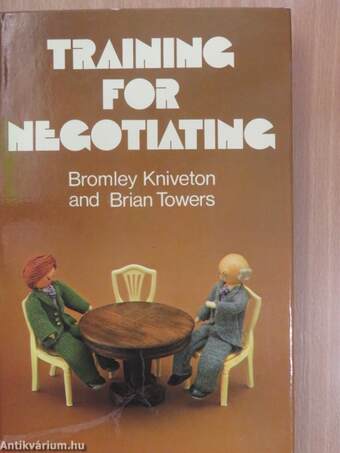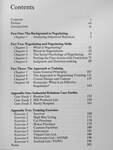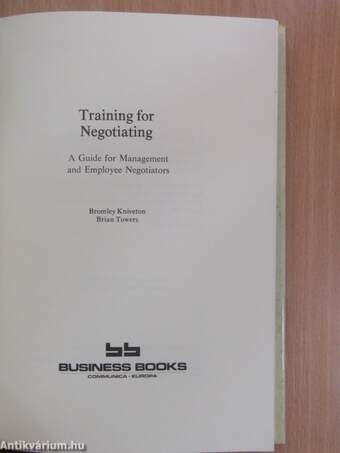1.067.327
kiadvánnyal nyújtjuk Magyarország legnagyobb antikvár könyv-kínálatát

VISSZA
A TETEJÉRE
JAVASLATOKÉszre-
vételek
Training for Negotiating
A Guide for Management and Employee Negotiators
| Kiadó: | Business Books Limited |
|---|---|
| Kiadás helye: | London |
| Kiadás éve: | |
| Kötés típusa: | Varrott keménykötés |
| Oldalszám: | 213 oldal |
| Sorozatcím: | |
| Kötetszám: | |
| Nyelv: | Angol |
| Méret: | 24 cm x 16 cm |
| ISBN: | 0-220-66347-5 |
naponta értesítjük a beérkező friss
kiadványokról
naponta értesítjük a beérkező friss
kiadványokról
Fülszöveg
TRAINING FOR NEGOTIATING
Dr Bromley H. Kniveton BA and Brian Towers
BA (Com), BSc (Econ)
It is often argued that good negotiators are born
and not created. In this book, the authors show
how misleading this view is, and present a
realistic analysis of negotiating—both industrial
and otherwise.
One of the difficulties of unofficial negotiations
is that they do not have a ritualistic pattern to
follow. The authors look at the social factors
within negotiations which influence the course
and outcome of those negotiations; where the
participants sit, how they dress and how they
manage to draw attention to themselves or
appear intimidating. The book looks
analytically at the ways in which we try to
persuade others and put over our case, and
explains why on some occasions we are
successful and on others we are not. It also
devotes a chapter to the ways in which we
make our decisions and shows how alternative
strategies can be used to make negotiated
deals look... Tovább
Fülszöveg
TRAINING FOR NEGOTIATING
Dr Bromley H. Kniveton BA and Brian Towers
BA (Com), BSc (Econ)
It is often argued that good negotiators are born
and not created. In this book, the authors show
how misleading this view is, and present a
realistic analysis of negotiating—both industrial
and otherwise.
One of the difficulties of unofficial negotiations
is that they do not have a ritualistic pattern to
follow. The authors look at the social factors
within negotiations which influence the course
and outcome of those negotiations; where the
participants sit, how they dress and how they
manage to draw attention to themselves or
appear intimidating. The book looks
analytically at the ways in which we try to
persuade others and put over our case, and
explains why on some occasions we are
successful and on others we are not. It also
devotes a chapter to the ways in which we
make our decisions and shows how alternative
strategies can be used to make negotiated
deals look more advantageous.
In the final chapters of the book, the authors
examine some of the difficulties which the
training officer has to face when dealing with
managers and shop stewards and offers
valuable guidance as to the ways in which
different teaching techniques can be used. An
explicit conceptual approach to training is
offered which incorporates all aspects discussed
in the first part of the book, and is based on a
realistic assessment of what the effective
negotiator should be. The appendix contains
numerous exercises which cover many aspects
of the training of negotiators and are designed
so that they can easily be adapted to suit the
local requirements of training officers and
educationalists. The ways in which these
exercises can be used are clearly explained and
the authors provide details of how they can be
analysed with examples so that the trainer can
make the most use of them and, in some
instances, discussion questions are included.
It is clearly a book which provides not only a
valuable background for the negotiator but
also a manual which the trainer or
educationalist should not be without. Vissza
Témakörök
- Közgazdaságtan > Menedzserképzés, marketing
- Idegennyelv > Idegennyelvű könyvek > Angol > Közgazdaságtan > Menedzserképzés, marketing
- Pszichológia > Alkalmazott lélektan > Pszichotechnika > Kommunikáció, konfliktuskezelés
- Pszichológia > Idegennyelvű > Angol
- Idegennyelv > Idegennyelvű könyvek > Angol > Pszichológia













